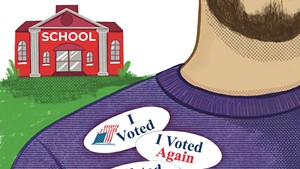
- File: Diana Bolton
It’s highly unusual for school districts to take legal action against the state agency that oversees them — much less to have three separate suits filed in a matter of months. The last time it happened, according to the Vermont Attorney General’s Office, was more than five years ago, when three lawsuits were filed related to forced mergers under Act 46, the state’s school consolidation law. The state ultimately prevailed in those cases.
The litigation comes at an especially trying time for education in Vermont, marked by an increasing number of students with acute social-emotional, behavioral and academic needs and spiking costs to provide services to address those issues. School spending overall has gone up, prompting repeated budget votes this spring amid concerns about property tax hikes.
The Agency of Education is experiencing challenges as well. It has been without a permanent leader ever since former secretary Dan French resigned in April 2023. Heather Bouchey served as interim secretary until April of this year, when Gov. Phil Scott appointed Zoie Saunders, a former charter-school strategist. But the Vermont Senate voted against confirming Saunders to the permanent position in late April due to concerns about her lack of experience working in public schools; the governor appointed her as interim secretary anyway.
Related Education Bill Would Speed up Secretary Search Process

Attorney General Charity Clark’s office is defending the three cases on behalf of the state. A spokesperson declined to comment on the ongoing litigation. Spokespeople for the agencies of education and human services did not respond to requests for comment.
The plaintiffs in all three lawsuits are represented by veteran special-education lawyer Marilyn Mahusky of Stitzel Page & Fletcher in Burlington, who worked for more than two decades for Vermont Legal Aid.
The two most recent suits were filed last month by the school boards of the Mountain Views Supervisory Union in Woodstock and the Springfield School District. They list Interim Education Secretary Saunders and Human Services Secretary Jenney Samuelson as defendants.
Both cases involve Medicaid-eligible students who the school districts enrolled in therapeutic, residential programs outside of Vermont because of severe behavioral needs. In both cases, the districts say the state declined to reimburse them for the costs.
Related Education Costs Are Driving Double-Digit Tax Hikes, and Legislators Are Scrambling to Lessen the Blow

The lawsuit demands $126,000 for two years' tuition that the district paid to the residential program.
The Springfield School District also alleges that the state took more than five months to respond to its plan to enroll a student out of state and seek reimbursement. The state ultimately denied Springfield’s reimbursement request, giving the same reasons it had in the Mountain Views case. Springfield is asking for $60,000.
Both school districts also assert that the state violated federal law because there are not adequate procedures in place to resolve disputes about reimbursement for special-education services.
Related With Schools in Crisis Mode, Kids With Disabilities Are Being Left Behind

Similar situations have popped up in other districts around the state, where disruptive behavior involving students with special education needs have increased since the pandemic.
“The school districts have stepped up in part because they have the legal obligation to do so,” but the state’s interagency process that is intended to support them appears to be broken, Mahusky said. Districts are “being asked to provide all of these services [that] go beyond education … and then when they try to follow the process that’s designed to be collaborative … I think they just end up being really frustrated.”
Mahusky said there have been other instances, besides those in Mountain Views and Springfield, in which the state has rejected a school district’s request for reimbursement. But the districts involved in the litigation, Mahusky said, had finally decided they could not keep fronting the costs of these placements.
The third suit was filed in early April on behalf of the Mount Abraham Unified School District’s school board. It centers around a prekindergarten student who lives in the district and qualifies for special-education services.
In Vermont, all 3- and 4-year-olds are entitled to 10 hours a week of free PreK services. Prekindergarten students with a disability, meanwhile, are entitled to more than that should a district determine that additional hours are necessary to provide that student with “a free and appropriate public education” — a commonly used special-education term. A child’s public school district is required to provide those special-education services.
Mount Abe determined last November that the student needed one-on-one paraprofessional help for a total of 20 hours a week — four hours every weekday morning. The child’s parent, though, asked the district for additional one-on-one support in the afternoon, according to the lawsuit. But the district denied the request.
Related Two School Districts Create Their Own Programs for Students With Special Needs

In the lawsuit, the school district conceded that, because of staffing shortages, it was unable to provide the full 20 hours a week of one-on-one support and thus violated the student’s special-education plan, or IEP. But the district also asserted that the secretary of education overstepped by directing the school district to provide the student one-on-one support for more than the 20 hours specified in the child’s plan.
The lawsuit asks the court to declare that the education secretary “exceeded her authority” and to direct her to revise the agency’s corrective action plan for the district. The suit also asks the court to invalidate a State Board of Education rule that prevents school districts from appealing administrative complaints.














Comments
Comments are closed.
From 2014-2020, Seven Days allowed readers to comment on all stories posted on our website. While we've appreciated the suggestions and insights, right now Seven Days is prioritizing our core mission — producing high-quality, responsible local journalism — over moderating online debates between readers.
To criticize, correct or praise our reporting, please send us a letter to the editor or send us a tip. We’ll check it out and report the results.
Online comments may return when we have better tech tools for managing them. Thanks for reading.